The timeline issue
+8
Mandrake
phantom10906
Becky
Raphael
HDKingsbury
Paula74
Scorp
Phantomlove
12 posters
Page 1 of 2
Page 1 of 2 • 1, 2 
 The timeline issue
The timeline issue
Or "The thing Phantom never got right"....
Originally the creative team of POTO put the auction in 1905, and the main storyline in 1881. That's what the libretto said, anyway. Looking at Maria Bjørnson's costume design, at least the dresses of Christine and Carlotta looks more 1870's (1873-76, to be exact.... ), so I wonder if they originally headed for the 1870's but pushed the storyline to 1881 to better match the timeline of Palais Garnier?
), so I wonder if they originally headed for the 1870's but pushed the storyline to 1881 to better match the timeline of Palais Garnier?
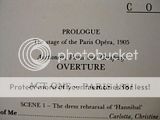
From "The Complete Phantom of the Opera" by George Perry
Problem is anyway that the timespan between 1881 and 1905 isn't too big (24 years, to be exact). Say Raoul was in his early or mid 30's (at the most) in the main story. That would mean he was app. 60 at the time of the auction scene. It doesn't match with what we see - old Raoul is an old man, with grey hair and beard and a shaky voice. He appears to be sick, but no disease alone could explain his condition as it is presented to us.
The original Hamburg libretto has either been aware of Bjørnson's design intentions, or wanted to correct the error of the original libretto. They still place the auction in 1905, but sets the storyline to 1871. This seems like a good solution, and would make Raoul app. 70 years in the auction. Match better with what we see, although he still seems a tad too young (yes, I know the average living age was shorter back then - but take into account that many died as infants or in early childhood. The average age is therefore a bit deceiving, and those who grew old could grow very old).
But one problem with the 1871 date is that Palais Garnier was offically opened in 1875. Besides, Paris was involved in the Franco-Prussian war in much of 1870 and 1871, and is therefore a not the best year to pick for telling a story of extravagant opera life... The 2004 movie also choose (if I remember correctly) 1870 as the year of the main story, which match just as poorly (and they pushed the costume design back to the 1860's, which also didn't match).

Original Hamburg libretto dates, in a Hamburg programme
Japan has the creative solution of placing the auction in 1905, while the main story takes place "in the middle of the 19.th century". This might give a hint of the 1860's, which definitely doesn't match Bjørnson's costume and set design, but again it might match Raoul's auction age better.

From a Japanese brochure
The current "solution" seems to be to place the auction scene in 1911, and the main story in 1881. It still doesn't correct the flaw of the timeline, but at least it gives us a 30 year difference instead of 24. These dates are used in most international productions, as well as the newer London brochures.
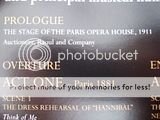
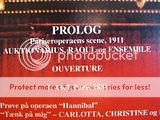

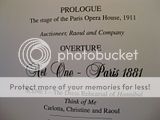
1. Australia/World Tour, 2. Denmark, 3. Sweden, 4. United Kingdom
The US brochures seems to skip dates alltogether, which probably is a good idea...
ETA: added places/references for all the pictures
Originally the creative team of POTO put the auction in 1905, and the main storyline in 1881. That's what the libretto said, anyway. Looking at Maria Bjørnson's costume design, at least the dresses of Christine and Carlotta looks more 1870's (1873-76, to be exact....

From "The Complete Phantom of the Opera" by George Perry
Problem is anyway that the timespan between 1881 and 1905 isn't too big (24 years, to be exact). Say Raoul was in his early or mid 30's (at the most) in the main story. That would mean he was app. 60 at the time of the auction scene. It doesn't match with what we see - old Raoul is an old man, with grey hair and beard and a shaky voice. He appears to be sick, but no disease alone could explain his condition as it is presented to us.
The original Hamburg libretto has either been aware of Bjørnson's design intentions, or wanted to correct the error of the original libretto. They still place the auction in 1905, but sets the storyline to 1871. This seems like a good solution, and would make Raoul app. 70 years in the auction. Match better with what we see, although he still seems a tad too young (yes, I know the average living age was shorter back then - but take into account that many died as infants or in early childhood. The average age is therefore a bit deceiving, and those who grew old could grow very old).
But one problem with the 1871 date is that Palais Garnier was offically opened in 1875. Besides, Paris was involved in the Franco-Prussian war in much of 1870 and 1871, and is therefore a not the best year to pick for telling a story of extravagant opera life... The 2004 movie also choose (if I remember correctly) 1870 as the year of the main story, which match just as poorly (and they pushed the costume design back to the 1860's, which also didn't match).

Original Hamburg libretto dates, in a Hamburg programme
Japan has the creative solution of placing the auction in 1905, while the main story takes place "in the middle of the 19.th century". This might give a hint of the 1860's, which definitely doesn't match Bjørnson's costume and set design, but again it might match Raoul's auction age better.

From a Japanese brochure
The current "solution" seems to be to place the auction scene in 1911, and the main story in 1881. It still doesn't correct the flaw of the timeline, but at least it gives us a 30 year difference instead of 24. These dates are used in most international productions, as well as the newer London brochures.




1. Australia/World Tour, 2. Denmark, 3. Sweden, 4. United Kingdom
The US brochures seems to skip dates alltogether, which probably is a good idea...
ETA: added places/references for all the pictures
Last edited by operafantomet on Fri Oct 02, 2009 9:09 am; edited 1 time in total
 Re: The timeline issue
Re: The timeline issue
I've read several places that the storyline of Bram Stoker's Dracula "Love never dies" is set in 1907. Is this confirmed, or just rumours?
If this indeed is the year, I smell more confusing storyline issues coming up....
If this indeed is the year, I smell more confusing storyline issues coming up....
 Re: The timeline issue
Re: The timeline issue
Actually in my libretto from my old LP album the dates are 1905 for the auction and 1861 for the action itself. So there is another confusion there. I just always assumed that those dates were just a mistake though.
 Re: The timeline issue
Re: The timeline issue
Where did you get the 1881/1905 date combo from? I can see the picture, just wondering where you've taken that from. First time I've seen that. Otherwise the usual combinations I've seen are 1861/1905 (this was used first of all, it's on my old OLC and my OLC programme but was changed pretty quickly since they'd only just started building the Palais Garnier in 1861) and then 1881/1911. I assume the 1881/1905 combo must be a stage that happened in between...
Don't forget all those issues with Christine's dad as well and the varying dates on the tombstone not matching the "three long years" lyric...
Unfornatelly the LND date *is* confirmed -- this is from the official site:

As I've said before, 1881 + 10 years does not 1907 make. If this were to do with the original show, I'd probably fire off a letter to ALW to let him know his mistake. Doesn't seem worth my time/effort in the case of the sequel, seeing as none of it makes any sense. Maybe we find out at the end it was all a drug-induced hallucination that old Raoul suffered (especially given the "music and memory can play cruel tricks" thing... )?
)?
Don't forget all those issues with Christine's dad as well and the varying dates on the tombstone not matching the "three long years" lyric...
Unfornatelly the LND date *is* confirmed -- this is from the official site:

As I've said before, 1881 + 10 years does not 1907 make. If this were to do with the original show, I'd probably fire off a letter to ALW to let him know his mistake. Doesn't seem worth my time/effort in the case of the sequel, seeing as none of it makes any sense. Maybe we find out at the end it was all a drug-induced hallucination that old Raoul suffered (especially given the "music and memory can play cruel tricks" thing...
 Re: The timeline issue
Re: The timeline issue
Oh, that's from the George Perry book (the libretto in the back), and it also seems that it's in the libretto translators use as well (if I remember correctly, I have spotted it in the Danish libretto too).Scorp wrote:Where did you get the 1881/1905 date combo from? I can see the picture, just wondering where you've taken that from. First time I've seen that. Otherwise the usual combinations I've seen are 1861/1905 (this was used first of all, it's on my old OLC and my OLC programme but was changed pretty quickly since they'd only just started building the Palais Garnier in 1861) and then 1881/1911. I assume the 1881/1905 combo must be a stage that happened in between...
I totally forgot about the 1861/1905 combo, thanks for adding that both of you!
 Re: The timeline issue
Re: The timeline issue
I'm surprised that they keep making these timeline mess-ups over and over and over again. If anything, stick to Schumaker's "parallelle universe" theory (OK, it might have been movie fans and not him coming up with that one...). It's just so annoying to see how much they can mess up the dates and years given.Scorp wrote:As I've said before, 1881 + 10 years does not 1907 make. If this were to do with the original show, I'd probably fire off a letter to ALW to let him know his mistake. Doesn't seem worth my time/effort in the case of the sequel, seeing as none of it makes any sense.
And year, "10 years after"? Which means the main story of POTO ended in 1881, but the Phantom hang around until 1897, when he disappeared for real?
THAT would explain a lot!Scorp wrote:
Maybe we find out at the end it was all a drug-induced hallucination that old Raoul suffered (especially given the "music and memory can play cruel tricks" thing...)?
 Re: The timeline issue
Re: The timeline issue
Actually, the main part of the musical ended in 1882, considering that act one starts in 1881 and new year's eve is in the middle of the action  .
.
 Re: The timeline issue
Re: The timeline issue
Oh, that's true! But it somehow still doesn't solve the timeline issue...Phantomlove wrote:Actually, the main part of the musical ended in 1882, considering that act one starts in 1881 and new year's eve is in the middle of the action.
 Re: The timeline issue
Re: The timeline issue
Phantomlove wrote:Actually, the main part of the musical ended in 1882, considering that act one starts in 1881 and new year's eve is in the middle of the action.
Haha, good point!
Yeah I'm sticking with the drug-induced hallucination theory. That would explain why Phantom no.1 is in his mid-late forties (using Michael Crawford as the role model), and why a decade later (but in actual fact 25 years later) Phantom no.2 is a young and sexy hunk (unless they try and age Ramin Karimloo, which I doubt they will). It's got to be botox or drugs. Take your pick.
 Re: The timeline issue
Re: The timeline issue
If we re-name the sequel into "Love Seldom Dies", we can officially call it LSD, and your explanation makes perfectly sense. Botox? Neeeh. I go for drugs. 
 Re: The timeline issue
Re: The timeline issue
As I've said before, 1881 + 10 years does not 1907 make.
Well, if we go with the 1881 date (which is the one I always thought was correct all this time) for the main story, the sequel says that 1907 is ten years after The Phantom vanished from the Opera House...not necessarily ten years after the night of Don Juan Triumphant's disastrous premiere and the related events in the lair later that night. So, maybe after vanishing into the throne, The Phantom laid low but remained in the Opera House until 1897 and then finally packing it up and moving to America, New York, and Coney Island.
Not that it makes any sense...but not much about the sequel does anyhow.
 Re: The timeline issue
Re: The timeline issue
Excellent discussion of what I've long found to be a sticking point--the totally mixed up timeline. Maybe it's just the historian in me, but since ALW uses the fictional Opera Populaire, why would it matter what was going on at the Garnier?
And the costumes in the movie? There isn't even a sniff of historical accuracy in them. And I despise the excuse that "it's just a movie." If you're going to state in big, bold letters at the beginning of the movie that it is taking place in 1871, then make it look like 1871. Otherwise, don't bother!
And the costumes in the movie? There isn't even a sniff of historical accuracy in them. And I despise the excuse that "it's just a movie." If you're going to state in big, bold letters at the beginning of the movie that it is taking place in 1871, then make it look like 1871. Otherwise, don't bother!

HDKingsbury- Posts : 128
Join date : 2009-09-29
Age : 124
Location : Ohio
 Re: The timeline issue
Re: The timeline issue
HDKingsbury wrote:And I despise the excuse that "it's just a movie." If you're going to state in big, bold letters at the beginning of the movie that it is taking place in 1871, then make it look like 1871. Otherwise, don't bother!
Amen to that. I've heard the "it's just a movie" or "it's all supposed to be fantasy" points plenty of times. I'm willing to let historical accuracy slide if no dates or real locations (behind something generalized like just "Paris") are mentioned. But once they specify an actual date...no excuses.
 Re: The timeline issue
Re: The timeline issue
HDKingsbury wrote:Excellent discussion of what I've long found to be a sticking point--the totally mixed up timeline. Maybe it's just the historian in me, but since ALW uses the fictional Opera Populaire, why would it matter what was going on at the Garnier?
I just wanted to disagree here that ALW uses the Opéra Populaire (in the stage version, I mean). Schumacher uses it in the film-that-I-pretend-doesn't-exist, but as far as I'm concerned it's an invention of Schumacher and not of ALW because it's all tied up with his young/sexy/bondage insanity (cf. all his comments about it being voluptuous and whatever; to be honest his Opéra Populaire looked a good deal better all ruined and wrecked than it did all garish and gold).
I know there's a small reference to the Opéra Populaire in the stage libretto ("Your days at the Opéra Populaire are numbered..."), but that's always struck me as simply referring to the fact that the Palais Garnier was the main opera house of the time, as opposed to other theatres. My view the stage version is set in the Garnier is also reinforced by:
- the fact that Hal Prince introduced the façade of the Palais Garnier and not some make-believe opera house in the Las Vegas production
- the inclusion of ALW's article about the Palais Garnier in all the programmes and souvenir brochures
- Maria Björnson's incredibly faithful designs: that chandelier, that staircase and that lyre motif is unmistakeably from the Palais Garnier
- the fact that the libretto of the stage version sets the prologue on the "stage of the Paris Opera House", not on the stage of some fictitious theatre.
Paula74 wrote:Well, if we go with the 1881 date (which is the one I always thought was correct all this time) for the main story, the sequel says that 1907 is ten years after The Phantom vanished from the Opera House...not necessarily ten years after the night of Don Juan Triumphant's disastrous premiere and the related events in the lair later that night. So, maybe after vanishing into the throne, The Phantom laid low but remained in the Opera House until 1897 and then finally packing it up and moving to America, New York, and Coney Island.
Ah, that *could* be a possible excuse for the discrepancies if it weren't for this (from the official casting notice):
“In 1907 New York, the mysterious ‘Maestro’ who runs the theatre at Coney Island announces a one-off concert by legendary Parisian soprano Christine Daaé. Her arrival in New York with husband Raoul, Victome de Chagny and son Gustave, and their subsequent meeting with the ‘Maestro,’ bring the cataclysmic events of 10 years earlier at the Paris Opera crashing back into all their lives.”
Basically I think they've screwed up. I'm getting suspicious now... who reckons the sequel is a sort of Max Bialystock-type plan? Best not to invest in it!
I'm procrastinating far too much today. My productivity so far = zero. I have Phantom on the brain...what else is new...
 Re: The timeline issue
Re: The timeline issue
1881/1911 is most definitely a product of the Leroux novel, although my research has led me to believe that 1881 could not have been the year the story took place either. As for the original and continuous re-arranging of dates, I think they've just given up entirely on any sort of continuity.
R.
R.
 Re: The timeline issue
Re: The timeline issue
The timeline issue: Daddy Daaé
OK, when was Daddy Daaé born? When did he die? How long before the main story was this? Now, that's a tricky one, with many different answers...
The different graves in the different productions gives us conflicting years of birth, but they all seem agree on the year of death: 1870. Which makes me think of Bjørnson's 1870's dresses. I don't know if 1870 is somehow specified in the costume design or notes on these (haven't seen the grave design), but I find it peculiar that even though there are numerous alternatives as to when he was born, all agree on the year of death.
Haven't found grave pictures from all productions, but here's what I got:
1821-1870:



(Australia, Korea, South Africa, World Tour, plus U.S.A)
1827-1870:

(Unless I've put this pic in the wrong file, it's from the UK)
1831-1870:


1841-1870:

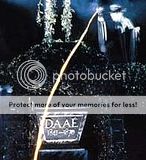
(Austria and Japan)
Is it only me, or are there some similarities in the first year as well? They all seem to end with either 1 or 7, which is a fairly similar number. And as mention, they all have 1870 as the year of death. I wonder if there are some years indicated in the design/notes, but a tad too blurry and therefore up to interpretation?
Hmmm. So he died in 1870. Which makes me think about the original/early WYWSHA verse saying that "Three long years I've knelt in silence, held your memory near me.... Three long years of murmured sorrow, willing you to hear me....". This was used very early on (in previews? Or just in an early concert version? Not sure, but there was a clip on YouTube of Sarah Brightman from the late 1980's using this lyric). That verse was also brought back to the West End production sometime in the early 2000's, but replaced by the "Passing bells...." lyric a few years later. Not sure what to think of that, except it place the main story sometime in 1872-73 (the graveyard scene is half a year later than in the first act). Again, it match the design of the Victorian day dresses of Christine, Carlotta and the Don Juan chorus - but it conflicts with everything we're told in libretti and brochures (except that original Hamburg one, indicating 1871).
Most brochures now say 1881 (1882) for the main story. I do find it odd for Christine to grief so bitterly for 11/12 years. Like.... get over it... In that aspect the early 1870's fits better. But I assume they just never bothered/thought about updating the grave design along with the the change of year in the libretto?
In that aspect the early 1870's fits better. But I assume they just never bothered/thought about updating the grave design along with the the change of year in the libretto?
I now see why the Swedish and Danish productions skipped the grave alltogether...
Scorp, I agree about the use of Palais Garnier in the stage version. Even in interviews the design team (Bjørnson and helpers) said the goal was to recreate that particular building, I think it was last repeated in the BBC "Behind the mask" documentary. And indeed, the use of the Palais Garnier facade in Las Vegas is a good indication of the stage version still aiming for that.
OK, when was Daddy Daaé born? When did he die? How long before the main story was this? Now, that's a tricky one, with many different answers...
The different graves in the different productions gives us conflicting years of birth, but they all seem agree on the year of death: 1870. Which makes me think of Bjørnson's 1870's dresses. I don't know if 1870 is somehow specified in the costume design or notes on these (haven't seen the grave design), but I find it peculiar that even though there are numerous alternatives as to when he was born, all agree on the year of death.
Haven't found grave pictures from all productions, but here's what I got:
1821-1870:



(Australia, Korea, South Africa, World Tour, plus U.S.A)
1827-1870:

(Unless I've put this pic in the wrong file, it's from the UK)
1831-1870:


1841-1870:


(Austria and Japan)
Is it only me, or are there some similarities in the first year as well? They all seem to end with either 1 or 7, which is a fairly similar number. And as mention, they all have 1870 as the year of death. I wonder if there are some years indicated in the design/notes, but a tad too blurry and therefore up to interpretation?
Hmmm. So he died in 1870. Which makes me think about the original/early WYWSHA verse saying that "Three long years I've knelt in silence, held your memory near me.... Three long years of murmured sorrow, willing you to hear me....". This was used very early on (in previews? Or just in an early concert version? Not sure, but there was a clip on YouTube of Sarah Brightman from the late 1980's using this lyric). That verse was also brought back to the West End production sometime in the early 2000's, but replaced by the "Passing bells...." lyric a few years later. Not sure what to think of that, except it place the main story sometime in 1872-73 (the graveyard scene is half a year later than in the first act). Again, it match the design of the Victorian day dresses of Christine, Carlotta and the Don Juan chorus - but it conflicts with everything we're told in libretti and brochures (except that original Hamburg one, indicating 1871).
Most brochures now say 1881 (1882) for the main story. I do find it odd for Christine to grief so bitterly for 11/12 years. Like.... get over it...
I now see why the Swedish and Danish productions skipped the grave alltogether...
Scorp, I agree about the use of Palais Garnier in the stage version. Even in interviews the design team (Bjørnson and helpers) said the goal was to recreate that particular building, I think it was last repeated in the BBC "Behind the mask" documentary. And indeed, the use of the Palais Garnier facade in Las Vegas is a good indication of the stage version still aiming for that.
 Re: The timeline issue
Re: The timeline issue
I've always thought Christine and her father were so extremely close that it would be natural for her to be in mourning for quite some time after his death. Maybe not 12 years, but definitely a significant amount of time, and even afterwards, it would be something that would always be a big factor in shaping her personality. But then again, I've always thought Christine was not entirely stable (Not entirely stable? Well I'm glad you're here to tell us these things!).operafantomet wrote:I do find it odd for Christine to grief so bitterly for 11/12 years. Like.... get over it...In that aspect the early 1870's fits better.
R.
 Re: The timeline issue
Re: The timeline issue
I think Christine could mourn her father for a really long time since they seem to have been very close, but at the same time I find it odd that he would have died that early. In the 2004 film they made him die when she was seven yes, but if you go by Leroux Raoul and Christine were teenagers when Daddy Daaé died. They were completely changed and talked of trivial things when they met. Raoul kissed Christine and then regretted it because he knew he couldn't marry her. I see them as 15-16 when Christine's father dies. I think it makes more sense that he would die when she is in those hard teenage years.
 Re: The timeline issue
Re: The timeline issue
Raphael wrote:
I've always thought Christine and her father were so extremely close that it would be natural for her to be in mourning for quite some time after his death. Maybe not 12 years, but definitely a significant amount of time, and even afterwards, it would be something that would always be a big factor in shaping her personality.
Speaking partially from personal experience here, I think it is possible for someone to grieve a very long time...especially if they were extremely close to the deceased parent and the surviving child is by nature extremely sensitive. Even if they're not overtly grieving all that time, I can see traumatic or stressful events - such as being stalked by someone who uses the memory of that dead parent for emotional manipulation - being enough to trigger a strong resurgence of that grief.
 Re: The timeline issue
Re: The timeline issue
operafantomet wrote:This was used very early on (in previews? Or just in an early concert version? Not sure, but there was a clip on YouTube of Sarah Brightman from the late 1980's using this lyric). That verse was also brought back to the West End production sometime in the early 2000's, but replaced by the "Passing bells...." lyric a few years later.
Actually the "three long years" verse was taken out of the West End production in the early 2000s, I think 2002 was the last time it was used. Since then it's been back to "Passing bells...". I remember "three long years" being used for quite a long time during the 1990s, but not sure when they started using it instead of "Passing bells". The Dutch production seems to have used it as well judging from the cast recording with Joke de Kruijf as Christine. Not sure about any other productions -- anyone know?
Christine Daaé (as in the fan who changed her name to Christine Daaé) wrote a small article about this called "Dating the Phantom" or something like that years ago. It's probably still somewhere on her (now significantly changed) site, phantomoftheopera.com .
 Re: The timeline issue
Re: The timeline issue
I thought it wasn't used between (app.) 1987 and 2000? I remember Celia Graham did the "Three long years" lyric when she started in the role (2002), but soon switched to "Passing bells", but I don't remember hearing any other than Claire Moore do it in the 90's. But maybe my mind is deceiving me.... It has happened before...Scorp wrote:operafantomet wrote:This was used very early on (in previews? Or just in an early concert version? Not sure, but there was a clip on YouTube of Sarah Brightman from the late 1980's using this lyric). That verse was also brought back to the West End production sometime in the early 2000's, but replaced by the "Passing bells...." lyric a few years later.
Actually the "three long years" verse was taken out of the West End production in the early 2000s, I think 2002 was the last time it was used. Since then it's been back to "Passing bells...". I remember "three long years" being used for quite a long time during the 1990s, but not sure when they started using it instead of "Passing bells". The Dutch production seems to have used it as well judging from the cast recording with Joke de Kruijf as Christine. Not sure about any other productions -- anyone know?
The "Three long years" lyric was originally in the Danish libretto, but I don't think it was performed on stage. If so, it must have been changed early on. That translation went like this:
Knæled' ned i år og dage, hæged' om dit minde (kneeled down in years and days, sheltering your memory)
Har jeg søgt det længst forgangne, uden dig at finde (have I sought the long gone, without finding you)
 Re: The timeline issue
Re: The timeline issue
Scorp wrote:
Christine Daaé (as in the fan who changed her name to Christine Daaé) wrote a small article about this called "Dating the Phantom" or something like that years ago. It's probably still somewhere on her (now significantly changed) site, phantomoftheopera.com .
I don't have time to read this through right now (though I feel like I might have read it a few years ago), but here's the article:
http://www.phantomoftheopera.com/modules/article/view.article.php/c6/11
 Re: The timeline issue
Re: The timeline issue
operafantomet wrote:I thought it wasn't used between (app.) 1987 and 2000? I remember Celia Graham did the "Three long years" lyric when she started in the role (2002), but soon switched to "Passing bells", but I don't remember hearing any other than Claire Moore do it in the 90's. But maybe my mind is deceiving me.... It has happened before...
I definately think it was used in the 90s, for quite some time though I don't know how long. I seem to remember that Jill Washington used in 98.
Interesting to hear about those Danish lyrics.
 Re: The timeline issue
Re: The timeline issue
Browsing through my Vienna brochure, I noticed they put the auction scene to 1905, while the main story begins in 1871.
 Re: The timeline issue
Re: The timeline issue
Well considering the entire show takes place in Raoul's memory, maybe he's just fuzzy on the details now that he's an old man 
R.
R.
 Re: The timeline issue
Re: The timeline issue
Raphael wrote:Well considering the entire show takes place in Raoul's memory, maybe he's just fuzzy on the details now that he's an old man
Heh, I like it!
Becky- Posts : 118
Join date : 2009-10-02
Age : 38
Location : Michigan
 Re: The timeline issue
Re: The timeline issue
Raphael wrote:Well considering the entire show takes place in Raoul's memory, maybe he's just fuzzy on the details now that he's an old man
R.
And yet he can still recall some very sexy apple porn.
 Re: The timeline issue
Re: The timeline issue
Oddly, I was thinking the same thing last night, reading Byatt's The Children's Book (where all the children seem destined to be killed or heartbroken by WW1) and so I noticed, if I remember correctly, that the dates on Christine's father's tomb were 1821 to 1872 (London).
Mandrake- Posts : 91
Join date : 2009-10-02
Age : 50
Location : Glasgow/ London
 Re: The timeline issue
Re: The timeline issue
operafantomet wrote:Browsing through my Vienna brochure, I noticed they put the auction scene to 1905, while the main story begins in 1871.
That's also the date on the Broadway version of the Auction catalog...
le Mercredi 4 Juin 1905
 Re: The timeline issue
Re: The timeline issue
Just mentioning that while the US brochures do not indicate dates, our Playbills (free programs) do all across the country, and indicate 1881/1911.
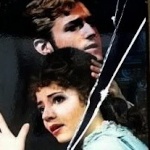
MajesticPhantom- Posts : 270
Join date : 2010-07-26
Page 1 of 2 • 1, 2 
Page 1 of 2
Permissions in this forum:
You cannot reply to topics in this forum
